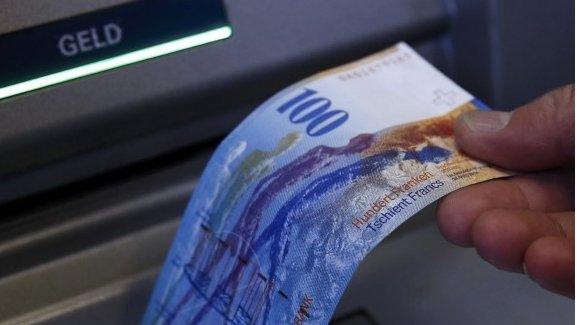Swiss franc soars as Switzerland abandons euro cap
- Published
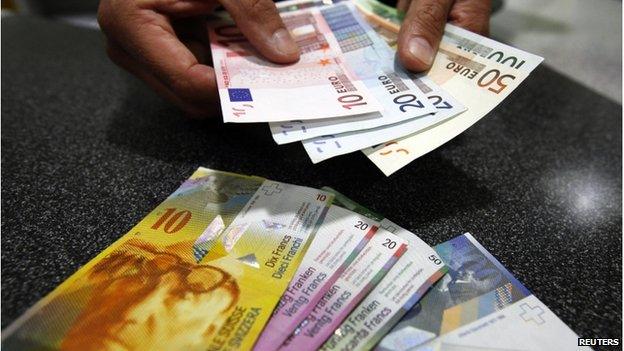
The Swiss franc soared as much as 30% in chaotic trade after the central bank abandoned the cap on the currency's value against the euro.
The Swiss National Bank (SNB) said the cap, introduced in September 2011, was no longer justified.
It also cut a key interest rate from -0.25% to -0.75%, raising the amount investors pay to hold Swiss deposits.
The International Monetary Fund's head, Christine Lagarde, called the move "a bit of a surprise".
She said she was also surprised that the governor of the Swiss National Bank had not contacted her, and said she hoped he had communicated the plan to his fellow central bank governors.
Following the SNB move the euro went from buying 1.20 francs to buying just 0.8052, but it later recovered to buy 1.04.
Swiss shares closed down 9% and stock markets around Europe fell with investors buying "safe haven" assets such as gold and German bonds.
Many investors believe that with the franc so strong Swiss companies will struggle to maintain export levels.
Watchmaker Swatch saw its share price slump 15%. Swatch chief executive Nick Hayek called the decision "a tsunami" for Switzerland's economy.
Mark Haefele, chief investment officer of Swiss bank UBS, estimated that the move would cost Swiss exporters close to 5bn Swiss francs (£3.3bn), equivalent to 0.7% of Swiss economic output.
One trader described trading after the unexpected announcement as "carnage".
While the Swiss franc was held at 1.20 to the euro it had tracked the euro's fall against the dollar.
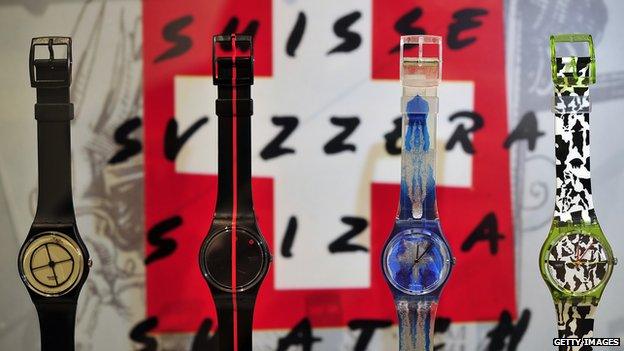
Watch the reaction: Swatch chief executive Nick Hayek called the SNB decision "a tsunami" for Switzerland's economy
ECB action
Many believe the euro will fall even further if the European Central Bank (ECB) starts quantitative easing, buying bonds to push cash into the eurozone banking system to stimulate a recovery.
Chris Beauchamp, market analyst at IG said: "My initial reaction was that it is a sign the ECB is about to do something, which makes it odd that the reaction has been so negative across European stocks.
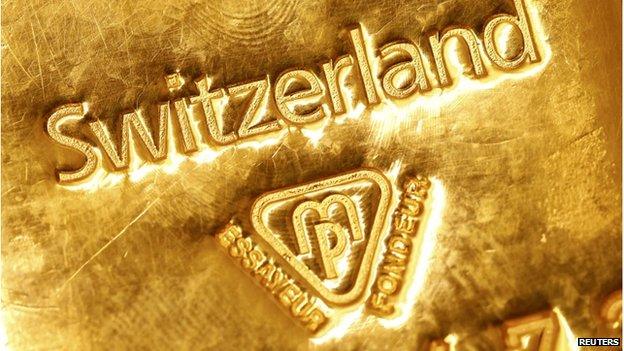
Safe haven - gold prices rose as the SNB removed the cap on the Swiss franc's euro exchange rate
"However, it's not every day that a central bank pulls the rug out from underneath something in such a massive way, and clearly people are worried that there's something bigger afoot."
Keeping the franc at 1.20 to the euro had became increasingly expensive for the SNB as it sold its own currency and bought up euros, sterling, US and Canadian dollars and yen, usually in the form of government bonds.
SNB foreign currency reserves, external have more than doubled since the cap was started in 2011 making it one of the five largest holders of foreign reserves in the world.

Analysis: Linda Yueh, chief Business Correspondent
In a statement explaining its policy, the SNB points to divergence among major economies; in particular, the weakening euro which has hit about the lowest level since its inception.
With anticipated cash injections by the ECB, the euro is expected to depreciate more against the US dollar and as the franc is pegged to the euro, the Swiss franc is weakening versus the dollar too.
So, they conclude that there is no longer "exceptional overvaluation" of the Swiss franc that justified the minimum exchange rate.
But, the reaction from markets is to push up the value of the franc since the appreciation pressures are still there.

- Published15 January 2015
- Published18 December 2014
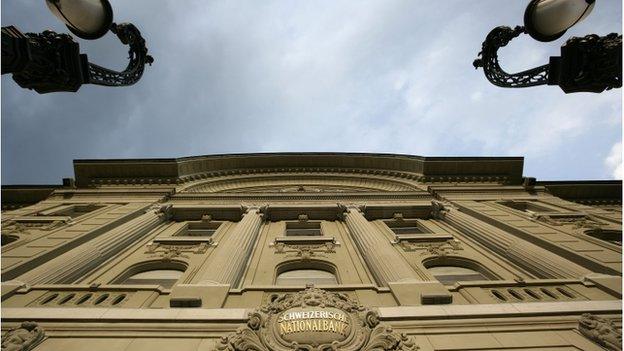
- Published18 December 2014
